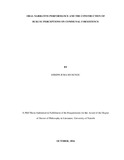| dc.description.abstract | This study set out to examine how oral narrative performance suggests the construction
of Bukusu perceptions on communal co-existence. The study was informed by the fact
that previous studies such as those by Makila (1978), Namulunda (2005) and (Bulimo
2013) were mainly concerned with collecting and recording Bukusu oral narratives. The
present study specifically examines oral narrative performance and analyses the nuances
that suggest Bukusu perceptions in these narratives. Such kind of study has not been
conducted at this level. The study aimed at achieving four objectives: to examine context
and meaning of Bukusu oral narratives, examine performance and meaning of Bukusu
oral narratives, analyse special language of narration and how it suggests meaning in
Bukusu oral narrative performance and examine how meaning in oral narrative
performance contributes to the Bukusu perceptions of other people. The hypotheses of
the study are that the meanings deciphered from the Bukusu oral narratives are subtly
suggested in the context of performance of these narratives; performance of Bukusu oral
narratives is significant in suggesting meaning; Bukusu oral narratives employ
specialised use of language to communicate Bukusu perceptions on communalcoexistence
and meaning in Bukusu oral narratives perpetuates Bukusu perceptions on
communal co-existence.
In theoretical framework, the study has employed an eclectic model in which
hermeneutics and performance theories have been used. Whereas hermeneutic orientation
provided the entry point of the meaning of Bukusu narratives, the performance
orientation was used to extend this further by examining the context within which these
narratives are performed. The study has also used ethnopoetics which has proved vital in
understanding of the significance of aural and visual features like mimicry, gestures, and
facial expressions in suggesting Bukusu perceptions as envisioned in oral narratives. This
combination is grounded in modern folkloristic perspectives which call for viewing of
oral texts as representations of collective thinking. In research methodology, the
collecting oral narratives and other relevant information consisted of participation,
observation, digital recording and oral interviews. Our analysis of individual narratives
has been guided by an analytical framework comprising a set of pertinent questions.Some of the key concerns in these questions included the way the Bukusu perceptions are
constructed using oral narrative performance as well as the way major issues are
portrayed in these narratives.
The study has established that context and performance are vital because they supplement
verbal articulations in constructing Bukusu perceptions. It has also been established that
Bukusu oral narratives extensively comment on both the Bukusu and other neighbouring
communities. The study has also established that whereas some of the narratives
construct “the other” negatively as treacherous, deceptive and ungrateful; there are
others, however, which acknowledge the value of these people for the continuity of
society through intermarriages. The study has equally established that through Bukusu
oral narrative performance, the community has designated certain roles and duties based
on gender differences. Finally, the study has established that Bukusu oral narrative
performance employs a wide range of language devices such as opening and closing
formulae, diminutive and augmentative language, coded songs, symbolism and imagery
as well as strategic repetition to construct Bukusu perceptions on communal co-existence. | en_US |



